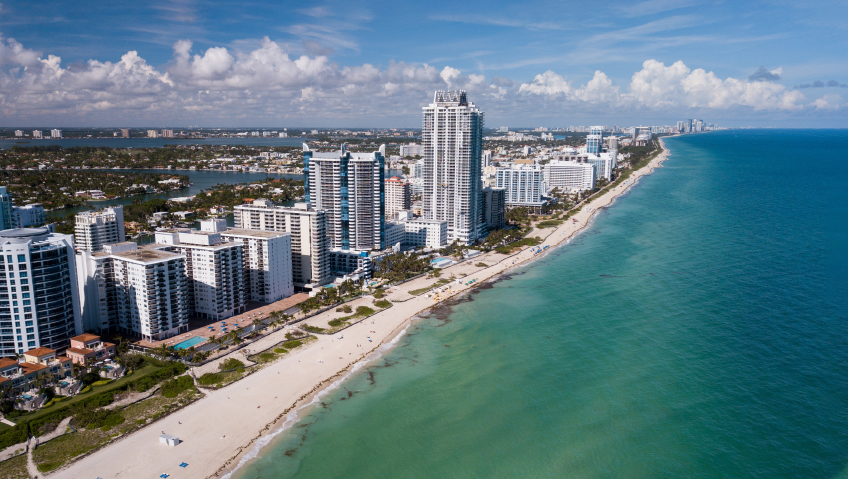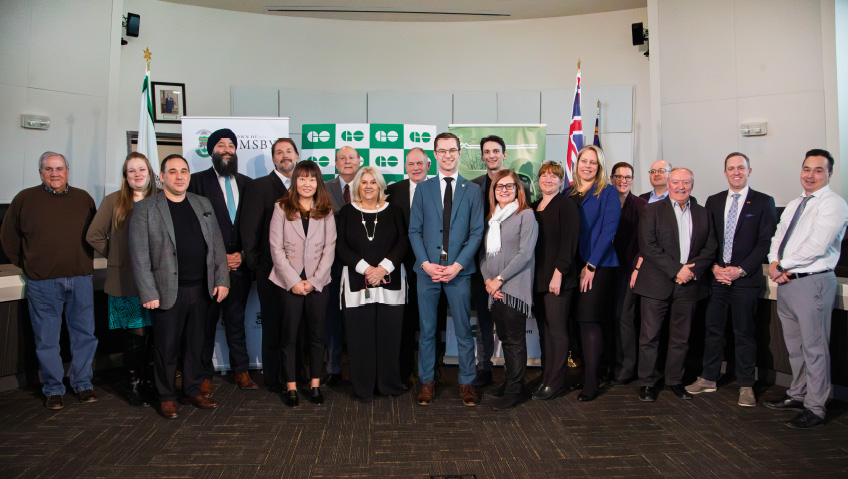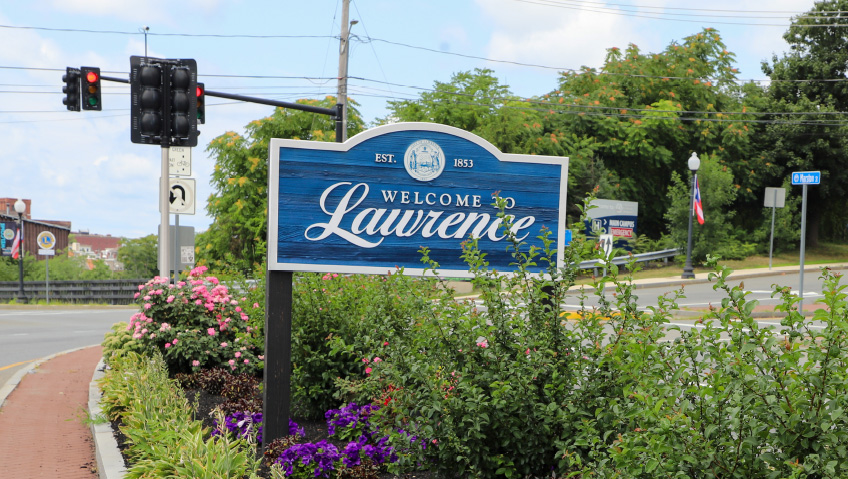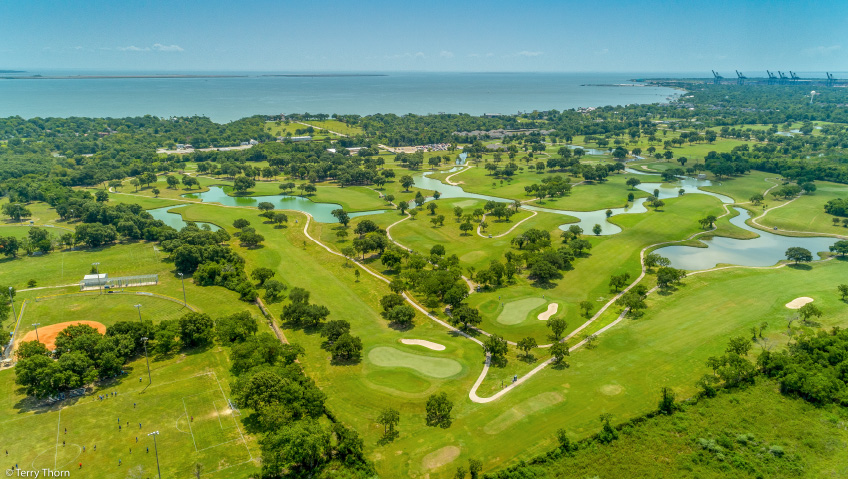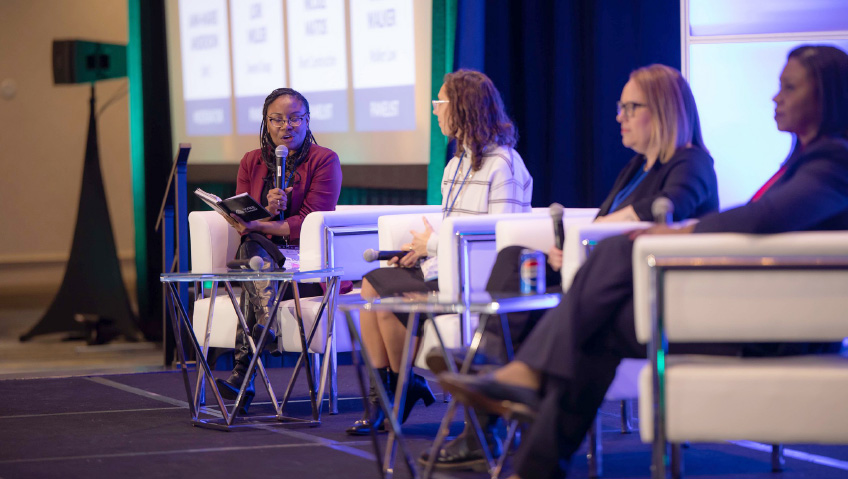As Miami-Dade County’s sixth-biggest city and home to nearly 70,000 people, the City of North Miami in South Florida is known for being as welcoming and culturally diverse as it is resilient. It is the “middle of the market” strategically located midpoint between several large business districts, two major seaports and two international airports at Miami and Fort Lauderdale.
Tanya Wilson, Director of Community Planning and Development, tells us more about the city’s vision and its promise to create a thriving and abundant future for all who live here.
Known for its natural beauty and varied landscapes, North Miami offers its citizens natural beauty and varied landscapes in eleven nearby parks and combine that with all the perks of modern city living. These inner-city parks and gardens welcome thousands of visitors annually. Wilson underlines how the city’s parks were returned to their rightful role of necessary spaces of retreat and reflection.
One such park, The Enchanted Forest Elaine Gordon Park has paved trails that wind through more than twenty acres of land with tropical fauna and flora along Arch Creek. The park contains picnic areas and activities for all ages.
“There’s something unique about having a city that has an urban landscape with commercial settings and tall buildings and spaces and plazas where people can gather for cultural arts events. It’s the tenets of a city… where people gather and commerce can occur,” Wilson says. “But nestled between all that hardscape are wetlands and trails and creeks and exotic wildlife,” she adds, marveling at what she refers to as the balance between two ecosystems. While North Miami “is very urban, it is also very green and sensitive and fragile,” she says. Being on the coast, one can even see dolphins from shore.
The city’s recreation facilities are top-notch, with beautifully tended sports courts and fields dotted about the urban landscape. Seven community centers create welcoming spaces for locals, while well-respected schools include the Florida International University (FIU) and Johnson and Wales University.
From carefully curated exhibitions at its Museum of Contemporary Art to the latest in all types of music, the city’s cultural life has much to offer. “We are respected when it comes to the arts communities, fine arts, and even in terms of culinary arts,” says Wilson. FIU’s globally-appreciated culinary arts program facilities have played host to several Iron Chef America shows.
The city of North Miami is a business-positive investor’s dream, with over $199 million poured into its infrastructure through private investment alongside more than one billion dollars in planned and executed real estate developments in just half a decade. Today, it has far over three and a half million square feet of retail and mixed-use space, and there is still room to grow.
Another crown jewel, Solé Mia, spans more than 180 acres just east of Biscayne Boulevard and will be comprised of a mixed-use development with a luxury village feel. Solé Mia sits on top of a cleaned and rehabilitated landfill site, proving that one person’s trash is another’s treasure.
“This is a great example of the reuse of a site that had no hope or purpose. It is a great example of what you can do to transform many of these brownfield sites that you see around the country and the world,” Wilson says.
The current timeline indicates that the opening of mixed-use, luxury apartment complex The Shoreline at Solé Mia will be in two years. The fifteen-year development of the rest of the site will offer more than one million square feet of commercial space and around 4,000 residential units and huge park spaces.
The site will also boast the ten-acre, 350,000-square-foot University of Miami Medical Center, a state-of-the-art medical facility with every conceivable medical specialist, all under one roof. International patients will have access to a nearby hotel that is part of the development, where they can recover and relax in luxury and privacy, overlooking Biscayne Bay.
The development promises to be a prolific job creator for the region, not to mention the subsidiary businesses and trade that will spring up around it to serve the needs of visitors and residents.
As well as this spectacular development, the city has seen a healthy response to its clustered mixed-use developments situated along its main corridors. One of the reasons for the positivity could be favorable interest rates, but its great urban design that allows for easy access to green spaces will also have a lot to do with its popularity in times such as these.
“We’re thrilled that preparation has now met opportunity. We were prepared for today because we started this intentional land use planning,” Wilson says. Part of this planning includes revitalizing largely forgotten areas throughout the city that promise handsome tax revenues once they are revived and reimagined.
When it comes to the international COVID-19 ordeal and North Miami’s survival, Wilson remains pragmatic. “Like the rest of the world and the rest of the country, we have been tested and tried, but we found a way to make lemonade from the lemons that we received,” she says.
Federal aid allowed the city to further train its workforce in medical and health science certification courses through online programs at FIU in collaboration with John Hopkins University. “That would not have been possible before but we took advantage of the resources [provided] by the Federal Government. We wanted to tailor our dollars and used it to up-skill our residents so that they could be fit for the market. The market right now is health-focused,” says Wilson.
The city also offered much support to small-to-medium outfits in the restaurant industry, especially those that were not geared toward online ordering and take-away. “We discovered that, even with the challenges, some of the old mom-and -pops that only had brick and mortar operations and only served from the soup counter were challenged to come into the digital space,” Wilson says.
Through collaboration with the website design and software development company Digital Pixel, the city provided technical assistance by providing software and hardware installation to Smart Biz Grant recipients. During the pandemic the North Miami Community Redevelopment Agency (NMCRA) also provided additional assistance to businesses with various grants. The Nomi Delivers Grant allowed businesses to register with delivery companies like Uber Eats, DoorDash, and others. “Many started to crank out more food from the ‘ghost kitchens’ [because] the city helped by giving them funding and a smart grant for a website and additional money so that they could afford to sign up,” she adds.
Wilson points out that the rise of e-commerce translates to hard times for businesses that cannot adapt but that it is possible to rise through the adversity thanks to federal grants. She also highlights that, surprisingly, as little as fifty percent of American small businesses have joined the online retail space, leaving much room for improvement. The city did its part to enable a smooth transition between old and new operating methods, helping many of its local businesses to join the technological era.
To create further resilience and income security for its citizens, the city also identified the very fickle and fragile hospitality industry as a starting point for economic reform. It now aims to provide workers in hospitality with the means and skills to secure alternative employment when the tourist industry is down. To achieve this, the city is inviting businesses in light industry, research and technology, and manufacturing across several sustainable fields to settle in the region and create a more stable income base for its people.
The city provides financial assistance to new businesses looking to settle in North Miami while helping to sustain existing businesses. In addition, a federal-granted green energy supplement allows it to provide businesses with energy audits in collaboration with Florida Power & Light, to mitigate energy waste and improve operational design and energy preservation. The initiative helps to protect the environment and saves businesses a great deal of money in energy savings.
Another funding source created by the city was the Legacy Grant that was designed to assist established businesses who have been in the city for at least 15 years. Many of these businesses have been in the city for many decades and form the backbone of North Miami’s economy.
“We set aside a grant pot just for [the older generation of business owners so that they] do not have to feel stressed. [They] can come in here and work with us,” says Wilson. “It was beautiful to hear the stories of many of them who have been here for forty or fifty years through recessions, through hurricanes, [and are still here through] COVID. [They are] committed to this city,” she adds.
“Look for the problems in your city. Do not retreat from them. Look at problems with new eyes and bring in different stakeholders that could help you bring about innovative solutions,” Wilson says. So, in a bid to refresh the central business district, the city approached FIU’s architecture faculty to explore new design guidelines for one of its main streets, Seventh Avenue. To the great delight of the city management teams, graduate students came up with brilliant facade and signage suggestions.
What becomes clear when talking with Tanya Wilson is that North Miami is about more than business. It is a city whose people have big hearts, especially when it comes to creating community.
As Wilson so wisely points out, a crisis is a terrible thing to waste. “A friend said this to me several years ago. I never truly got it until we were [amid] COVID-19, because even [during] a crisis, there is still opportunity for growth. A crisis is a time to plan and reposition yourself as a city, to get ahead,” she says. And this is true. The glittering City of North Miami is planning its way to a successful future, and there is most certainly much more grit to the diverse folks of North Miami than appears at first glance. If there is one example of what a city of the future should look like today, it is this one.
Sidebar 1:
NoMi Business Park Powered by The Greater North Miami Chamber of Commerce
After more than 30 years since its last building renovation, The Greater North Miami Chamber of Commerce (GNMCC) is opening its doors with a new look, strengthened mission and determination to spark an economic revitalization.
“The time for flexible workspace is right now,” said David Burney, Chairman of GNMCC. “[The] COVID-19 pandemic deeply affected our business community, decimating so many of local entrepreneurs. Our Chamber will be on the forefront, leading a rebound of business relaunch and start-ups.”
With its sleek décor and state-of-the-art technology, the business park enables entrepreneurs to rent co-working space to suit their individual needs. Affordable pricing plans are available, including hourly, daily, weekly, monthly and annual rates, and features include:
• Ergonomic desks & chairs
• New computers & laptop hookup
• Photocopy/fax/scan services
• High Speed WIFI Internet access
• Post & parcel services
• Meeting space rental
“We are more than office space; we are a community,” Burney said. “Businesses can obtain a GNMCC Certificate of Use and a City of North Miami Business Tax License to have an official office mailing address for your business or nonprofit organization.”
And, coming soon…
GNMCC will open its Outdoor Nature Pavilion with new backyard meeting/event space, and host a bevy of incubator programs to support business resources, including state registration, municipal licensing, fiscal management, marketing, a digital portfolio and so much more.
“There are so many exciting things happening in the City of North Miami, and I greatly look forward to our vibrant future,” Burney said.
Stop by the GNMCC at 13100 West Dixie Highway, North Miami, FL 33161, Monday to Friday from 9:00 am to 4 pm. For more information, visit www.NorthMiamiChamber.org or contact 305-299-6162 or info@NorthMiamiChamber.com.
~
Sidebar 2:
The Haitian American Chamber of Commerce of Florida (HACCOF) – Building Strong Community Partnerships
The Haitian American Chamber of Commerce of Florida (HACCOF) is a non-profit organization established in 2005. Its mission is to serve as an advocate for its communities as well as a resource for consumers and businesses dedicated to serving both the needs of its members and the economic development demands of the broader Haitian American community.
HACCOF is the leading organization coordinating and facilitating networking programs and hosting educational, local, and international trade forums and other initiatives to help to build healthy business climates, foster investment opportunities, create employment growth, and encourage public and private sector collaboration.
HACCOF believes that Young Haitian American Professionals are a vital asset to Florida and the United States. In 2016, HACCOF launched its annual Award Ceremony honoring the “Top 20 Under 40” Haitian American Young Professionals (YOPROs) for their Leadership, Professional Excellence, and Community Involvement. HACCOF is proud to announce that it will be honoring its 2021 class of “Top 20 Under 40” Haitian American Young Professionals (YOPROs) on Thursday, September 30, 2021.
HACCOF established the HACCOF Foundation in 2018 as a direct-support organization to assist HACCOF in raising additional funds to serve the larger community. The HACCOF Foundation is leading the Earthquake Relief Effort with its partner organizations in Haiti to provide disaster relief assistance to its brothers and sisters impacted by the 7.2 magnitude earthquake that affected the southwestern part of Haiti on Saturday, August 14, 2021.
For more information and to learn of ways you can help, visit www.haccof.com.
~

